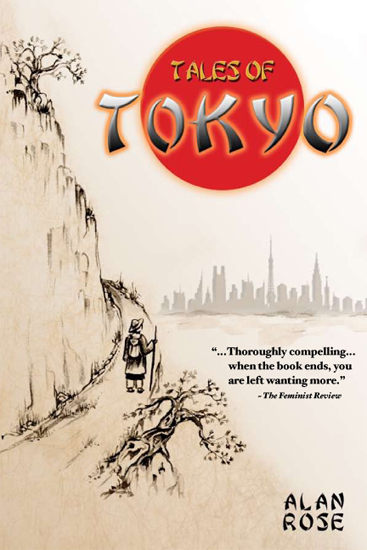 An Interview with M.L. Madison, contributing editor, The Feminist Review
An Interview with M.L. Madison, contributing editor, The Feminist Review
**Spoiler Alert: This interview reveals key surprises in the book.**
Where did you get the idea for this book?
It was 1982, and I was on Mt. Takao, outside of Tokyo, observing O-Hanami (The Festival of Cherry Blossom Viewing), when I had an image of four young people flying to Japan at that very moment. They were each coming from a different direction, as if their destinies were drawing them together—I had to change that later so two of them could be on the same plane—and I knew each was on a personal quest, seeking something in coming to Tokyo. I also knew that one of them was going to die before the year was over.
Who was your favorite character and why?
That's like asking who is your favorite child. I love each of them for who he or she is: Delia's confidence, drive and determination; Chris's basic decency and kindness; Sally's innocence and sweetness; Jason's hunger for a deeper meaning to our lives.
The writing makes one think that the book is autobiographical. Is that the case?
 |
Somerset Maugham said that all novels are autobiographical. I did live and teach in Tokyo in the early eighties. Some incidents in the book are based on actual experiences—for example, once complimenting an elderly flower seller on her "delicious flowers"—but the book is three parts imagination to one part memory.
Were any of the characters in the book based on people you knew In Japan?
My best friend in Tokyo was a woman from Sydney, and she was the inspiration for Delia's character. The character of Ian was based on a Canadian missionary I met with on a regular basis while I was living there. But, as he once told me, much of the Wise Old Man I found in him was in me all the time. From him and several other wise elders I have known, I created Ian's character.
What was the hardest part of the book to write, and what was the easiest?
The hardest was the ending. How to convey Jason's experience at Matsushima in such a way that the reader could experience it with him? I wanted the reader to go through Jason's dying, and then to experience his re-birth.
The easiest part to write, I think, was the Interlude. I was stuck and frustrated at one point, and I used a technique I had employed before to write myself out of a block: I started a dialogue with my characters about how the book was developing, and the dialogue just flowed (they seemed very eager to weigh in!) and it was as if I was really having a conversation with them. In a way that other fiction writers will understand, I think I was. There was polishing later, but the core of that chapter is pretty much as I first wrote it.
Some authors say they find the characters taking over the story. Did you experience that in writing Tales of Tokyo?
Most definitely. Especially with Jason. He surprised me a number of times, especially that night in Nagasaki. I was thinking—No, he wouldn't do that. And he did! I was surprised that Delia became very close to Sally, as toward a kid sister—that wasn't in the earlier drafts. I was surprised when Sally and Chris wound up in bed together (Who knew!) And I still don't know what the hell happened with Chris the night he went on that binge in Shinjuku!
So, did any part of the book turn out radically different from how you had planned it when you started?
Several parts. The structure first: I had intended it to be a collection of short stories, with one of the four main characters' point of view dominant in each story. But over time, the stories sort of mushed together into a novel.
And certainly, the ending. From the start, I was pretty sure that Jason was the one who was going to die. He had death written all over him. But I left open the possibility that it could be one of the other three. As the story went on, and Jason's character evolved, I began to sense that it was going to be more of a metaphorical death and rebirth.
A friend, after she had read an earlier version of the manuscript, said flatly, "Jason should have died". Later, when I told her that I was considering this possibility, she was horrified: "But you can't kill Jason!"
It was never my intention to mislead the reader. At some point it was no longer my story; it became Jason's.
This is a very different book from your first novel. How were they different to write?
This novel is much more unconventional than Emily Hargraves. I took more risks with it—for example, having the reader step out of the story at times with the author.
Also, this novel is much more personal—and more personally revealing. There is a lot more of me in this novel. Emily Hargraves was a product of my imagination, whereas Tokyo is based on my time living in Japan. It is memory, plus imagination (I consider memoirs a legitimate form of fiction.)
Both books also share what your editor called an "unabashed eroticism." Do you find it difficult or not to write about sex?
Not really. These are four young adults, all who are sexual beings—or want to be. And I think writing about sex is no different than writing about any other powerful experience. If I write a sad scene, I want the reader to feel sad, maybe shed a tear; if I write a funny scene, I want the reader to laugh. And if I write a sex scene, I want the reader to feel ... well, hot.
What are you working on now?
I have long been intrigued by the idea of a utopian society and what it would look like. Very different from ours, certainly, but in what ways? I want to create a perfect society, and I think it will be rather shocking to readers because our society—what we consider normal—is so far from perfect.
I think I am a novelist of ideas. Emily Hargraves started with the idea of the paranormal and how one begins to understand such experiences in our modern, psychological age. The idea of the quest and the archetypal Hero's Journey is central to Tales of Tokyo. In this new book, it is the idea of utopia that fascinates me. I just need to find a story to hang it on.

